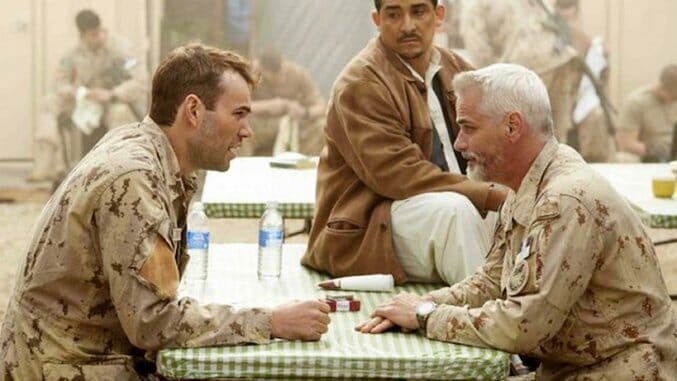Hyena Road

A Canadian military perspective on anti-terror operations in Afghanistan, Hyena Road is not without its admirable qualities. It presents an authentic vision of life on and around the Middle Eastern battlefield. It provides a compelling view of its locale, with Jordan (and the Winnipeg area’s Canadian Forces Base Shilo) subbing in for vast, rocky Kandahar. It features performances that never indulge too heavily in hammy affectation. And it offers a sobering take on the possibility of effecting real change in a country with a history of endless conflict. Yet despite those elements, writer-director-actor Paul Gross’ film lacks the one thing that might actually make it more than a compendium of Hollywood-style gestures and attitudes: a plot.
Hyena Road runs two hours long, but its entire narrative could be wedged into a half-hour documentary; for much of its duration, Gross’ film is a slog of largely purposeless exposition surrounded by a few instances of bracing but monotonous firefights. One of those skirmishes comes at the tale’s outset, as sharpshooter Ryan Sanders (Rossif Sutherland), after eliminating an enemy intent on planting an IED, finds himself and his squadron fleeing a horde of Afghan combatants—an escape that ultimately succeeds with the help of a local elder (Niamatullah Arghandabi) with one blue eye and one green eye who gives the soldiers shelter.
That miraculous turn of events is of particular interest to intelligence officer Pete Mitchell (Gross), who almost immediately deduces that Sanders’ savior is a former freedom fighter known as “the Ghost” who, decades earlier, helped repel the Soviets. Even more intriguing, the Ghost’s exile has something to do with his relationship to BDK (Fazal Hakimi), a regional gangster whom Mitchell is working with in the hopes of finishing construction of Hyena Road, a crucial roadway. All of that is relayed by Mitchell in a nonstop stream of dialogue about people, places and situations that are rarely dramatized on screen. Though the actor has a commanding baritone voice that makes such details go down relatively smoothly, the overriding effect of Gross’ tell-don’t-show approach is to render the film a morass of meaningless chatter.
-

-

-

-

-

-

-

-

-

-

-

-

-

-

-

-

-

-

-

-

-

-

-

-

-

-

-

-

-

-

-

-

-

-

-

-

-

-

-

-








































